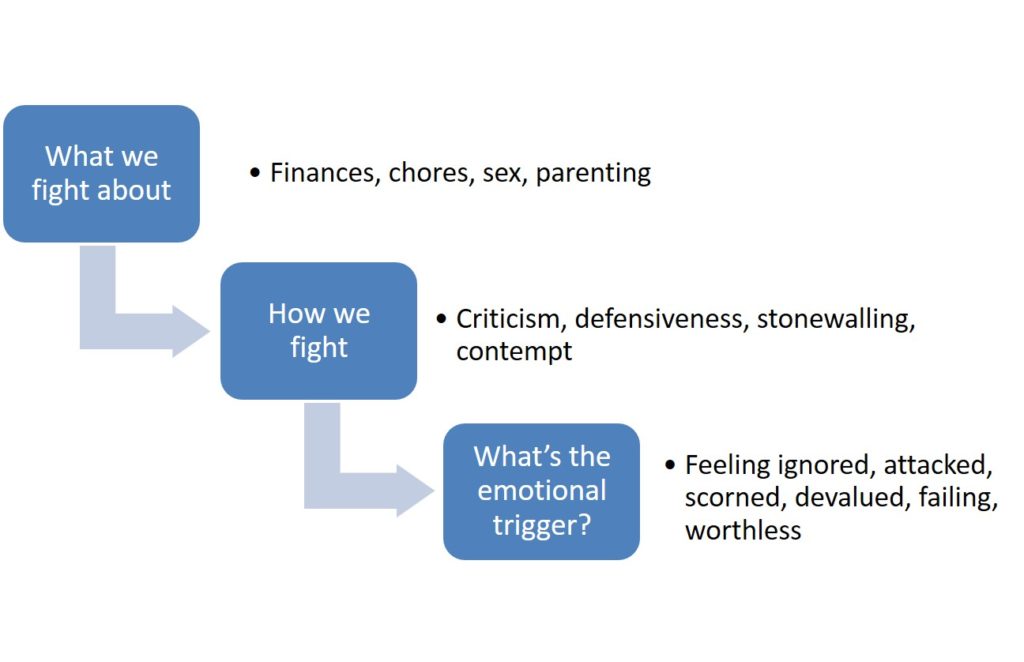This Is About That
Michelle and I met with a couple that were fighting about how much time they should spend at her parents when they visited that weekend. We tried to get them to agree on the amount of time. He said 2 hours and she said 6 hours. Eventually, they compromised. He was at 4 hours and she was at 4 hours and 15 minutes. They couldn’t close the gap between the last 15 minutes.
Suddenly, it occurred to me. This isn’t about how much time they spend at her parent’s house. This was about something else. Negotiating a compromise wasn’t helping.
There are different levels to what couples fight about. Sometimes, the real issues aren’t the surface issues.
 Level One: What We Fight About
Level One: What We Fight About
Couples fight about all kinds of topics: finances, chores, sex, parenting, etc. All of us do this. What causes the most trouble isn’t the topic we are fighting about, but something much deeper.
The couple that was fighting about how much time to spend at her parent’s house wasn’t about that. As mentors, if we focus on resolving these issues, we may not get to what’s really happening.
Level Two: How We Fight
If you haven’t read any of John Gottman’s books, please do so. He is one of the best known marriage researchers in the world. One way that he studied relationships was by putting couples in a “love lab” or an apartment and watching their interactions. He identified what he calls the Four Horseman of the Apocalypse: criticism, defensiveness, contempt and stonewalling.
This is all about how we fight. These patterns happen over and over again, regardless of the topic of the disagreement. These behaviors tear down the marriage bond.
Marriage education can help a couple to identify how they use these behaviors and the effect that is has on their relationship.
Level Three: What’s the Emotional Trigger?
Have you ever just lost it? Have you reacted to something in a way that doesn’t make sense? Someone says something or does something that triggers something inside of you.
I know I have. I used to invalidate Michelle’s feelings. When she would get emotional, something inside of me clicked and I responded with logic. That was my way of dealing with emotions – ignore them and put on an analytical grid. My reaction was something that I learned in my childhood. If you would have confronted me, I would have responded with a logical argument about why what Michelle was doing didn’t make sense. Not exactly responding in love, right?
When I learned the impact on Michelle of my actions, it helped me to think about emotions differently. This is part of what I needed to change in order to validate and to show love to Michelle.
These triggers can be things like feeling ignored, attacked, scorned, devalued, failing, worthless, etc.
As you are mentoring couples, recognize that what you are hearing may not be what it is really about. Be aware that there may be different levels to any given argument.
Often, these are things that are deep within us. They may be from our childhood.
Tips for Marriage Mentors:
- Recognize the conflict pattern – What does this look like? Does the couple the same things over and over again?
- Raise awareness – When we’ve taught couples about conflict patterns and helped them to recognize their poor behaviors, they start to become aware of how it’s tearing them down. Once they understand this, it’s easier to make different choices.
- Emotional triggers – Sometimes, all a couple needs is to understand that they are being triggered. When they understand these deeper issues, it can raise empathy for their spouse.
Mentoring in the Church
I believe that the church has a huge opportunity to impact the lives of couples. Many couples wait too long to seek professional help, if at all. Part of my mission is to equip lay people.
However, I value mental health professionals. As a lay person, I know that some of the emotional triggers aren’t easily solved. Some of these are much deeper issues and will require a professional to help people to work through them. Often, marriage education and therapy go hand-in-hand. If you are in doubt, refer the couple to a professional.
Other posts in this series on relationship complexities that mentors will see:
A Behavior, by Itself, Isn’t That Harmful
You Don’t Understand the Impact
There Are Multiple Behaviors to Change





Comments are closed.